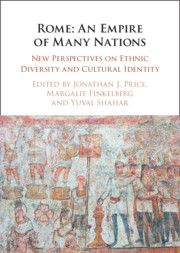Book contents
- Rome: An Empire of Many Nations
- Reviews
- Rome: An Empire of Many Nations
- Copyright page
- Contents
- Figures
- Contributors
- Acknowledgments
- Abbreviations
- Introduction
- Part I Ethnicity and Identity in the Roman Empire
- Part II Culture and Identity in the Roman Empire
- Part III Ethnicity and Identity in the Roman Empire
- 10 Religious Pluralism in the Roman Empire
- 11 Rome’s Attitude to Jews after the Great Rebellion – Beyond Raison d’état?
- 12 Between ethnos and populus
- 13 Local Identities of Synagogue Communities in the Roman Empire
- 14 The Good, the Bad and the Middling
- 15 The Severans and Rabbi Judah ha-Nasi
- Part IV Iudaea/Palaestina
- Bibliography
- General Index
- Index Locorum
10 - Religious Pluralism in the Roman Empire
Did Judaism Test the Limits of Roman Tolerance?*
from Part III - Ethnicity and Identity in the Roman Empire
- Rome: An Empire of Many Nations
- Reviews
- Rome: An Empire of Many Nations
- Copyright page
- Contents
- Figures
- Contributors
- Acknowledgments
- Abbreviations
- Introduction
- Part I Ethnicity and Identity in the Roman Empire
- Part II Culture and Identity in the Roman Empire
- Part III Ethnicity and Identity in the Roman Empire
- 10 Religious Pluralism in the Roman Empire
- 11 Rome’s Attitude to Jews after the Great Rebellion – Beyond Raison d’état?
- 12 Between ethnos and populus
- 13 Local Identities of Synagogue Communities in the Roman Empire
- 14 The Good, the Bad and the Middling
- 15 The Severans and Rabbi Judah ha-Nasi
- Part IV Iudaea/Palaestina
- Bibliography
- General Index
- Index Locorum
Summary
This chapter addresses what appears to be a puzzling paradox. The Romans enjoyed a reputation for broad-mindedness in matters of religion. Their empire contained a multitude of diverse peoples with varied and sometimes outlandish rites, beliefs, and gods. Far from suppressing such practices, the Romans even imported alien cults and made them part of their own extended system of honoring divine powers. Acceptance and embrace of a wide range of modes of worship characterized Roman image and practice. Could this liberal attitude toward religious pluralism extend even to the Jews, notorious as an exclusivist monotheistic sect? The evidence, on the face of it, suggests hostility among Roman intellectuals toward Jewish separatism and offers disturbing examples of official actions against practitioners of the religion itself. How does one account for this apparent exception to general Roman policy? This chapter questions many of the assumptions behind this ostensible paradox. It argues that Jews were not as separatist as often thought, that their diaspora communities in the empire were acknowledged and supported by Roman authority, that official actions against the religion were decidedly exceptional and not at all characteristic, and that abusive comments by Roman intellectuals were no more meaningful than those expressed about numerous other cults that flourished in the empire.
- Type
- Chapter
- Information
- Rome: An Empire of Many NationsNew Perspectives on Ethnic Diversity and Cultural Identity, pp. 169 - 185Publisher: Cambridge University PressPrint publication year: 2021

